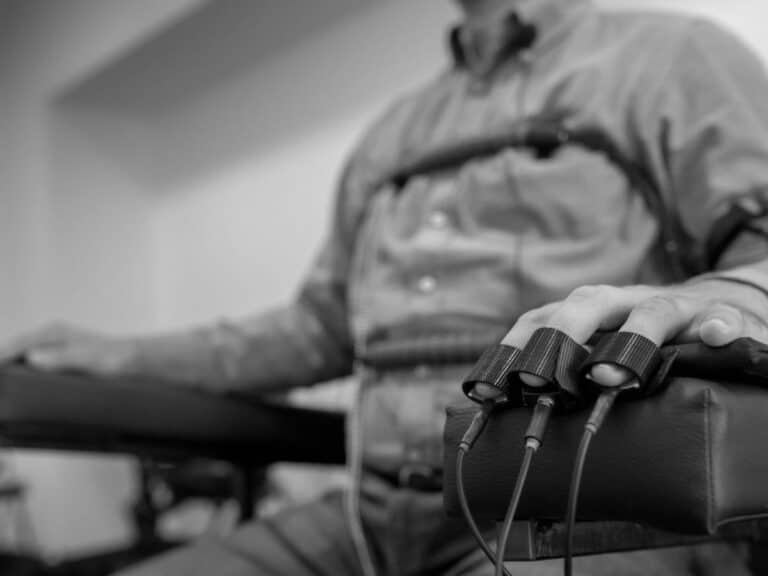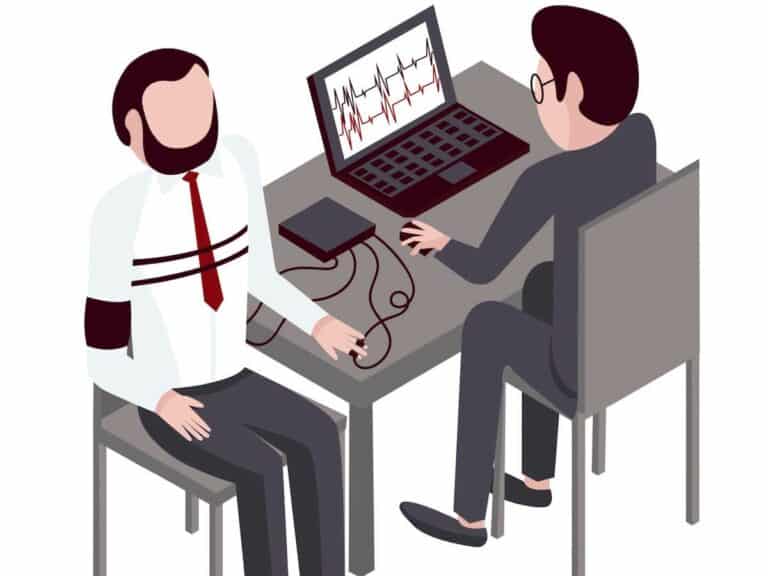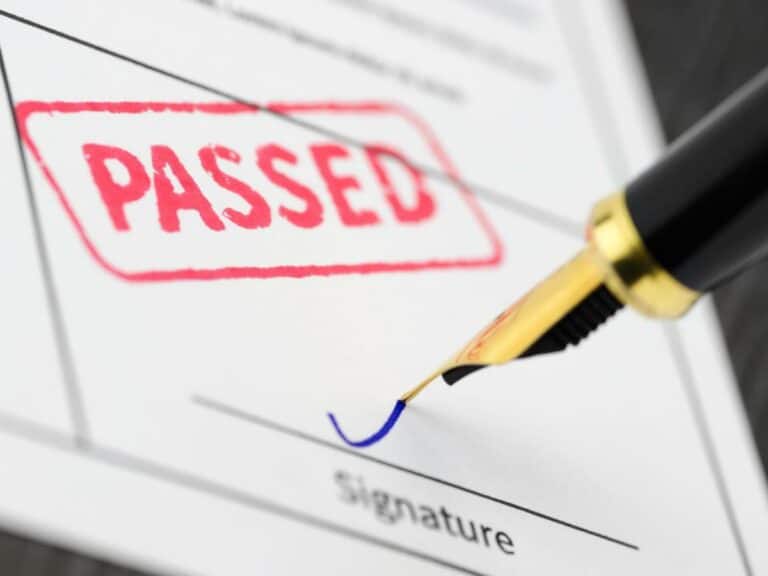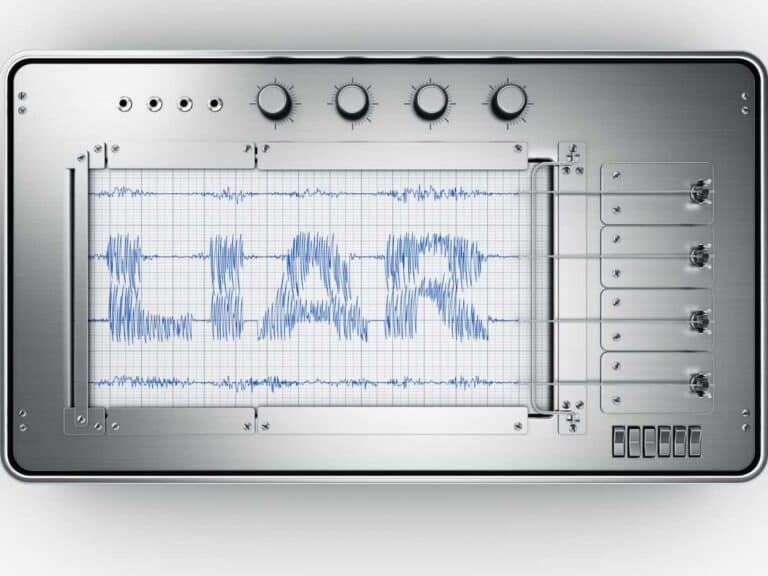These Medical Conditions Affect a Polygraph
A lie detector machine cannot directly tell whether or not you are lying. What it does is monitor physiologic changes in you that can be associated with being deceitful. And then the polygraph examiner collects and evaluates the readings and decides whether the examinee passes or fails the test.
Unfortunately, there are certain things that can mess up those physiologic processes that a polygraph machine monitors. Some of them have something to do with the mental or physical health of the examinee.
This post is all about medical conditions that can have an effect on the result of your lie detector test.
Having one of the things I will discuss below requires you to inform the examiner of its presence as well as any medications you are taking for it before the polygraph test is administered. In some instances, you may be strongly advised against undergoing it as the result may only wind up inconclusive or a false positive or a false negative.
1. Hypertension

According to WHO, you have high blood pressure or hypertension if your everyday blood pressure reading consists of a systolic blood pressure reading (the top number) of 140 mmHg or higher and a diastolic blood pressure reading (the bottom number) of 90 mmHg or higher.
There are a couple of things about hypertension that can affect a polygraph test.
First, it can keep your blood pressure readings elevated while you are strapped to the lie detector machine — spikes in the blood pressure are some of the things that a polygraph examiner looks for.
Hypertension should not really interfere with a polygraph result since you will have a different blood pressure when being truthful and being deceitful. The problem, however, comes in when the examination is administered by an incompetent examiner who fails to consider that you are suffering from high blood pressure when reading the chart.
If you are taking medications in order to put your hypertension in check, your blood pressure tends to be lower. It’s also not unlikely for your heart rate, which is another thing that a lie detector machine checks, to be slower.
Someone who is guilty and taking blood pressure drugs may have a false negative polygraph.
Mental Illness
There are a few mental illnesses that can affect the result of a lie detector exam, making an individual appear guilty when he or she is not or even seem innocent when he or she is guilty.
2. Anxiety
What makes it possible for a polygraph machine to do its job is its ability to pick up physiologic changes when a person is stating lies. Although this allows it to be accurate anywhere from 80% to 90% of the time, it’s also something that can cause it to yield an error when the examinee is suffering from anxiety.
A lie detector test machine is sensitive to changes in your body if you are trying to be dishonest — knowing for yourself you are lying can make you feel nervous.
Having anxiety can make you on edge most of the time, whether or not you are undergoing a polygraph exam.
In most instances, the intake of anti-anxiety drugs can make matters worse. The presence of their active ingredients in the examinee’s system can cause complete relaxation. So much so that his or her vitals practically stay the same even when being deceitful, which would otherwise cause someone else to feel stressed and nervous.
This can be a problem if the individual who is undergoing a lie detector examination is completely guilty as there is a possibility for the result to be a false negative — bye-bye, accusations!
3. Depression

When the mind is depressed, the body tends to be depressed, too. As a matter of fact, European medical literature says that it’s not uncommon for people with depression to have low blood pressure.
Suffering from depression can make you lose interest in the things that would otherwise make you feel happy and excited. And this can leave you physically inactive, which can cause your blood pressure reading to be lower than normal. It can also cause low heart and respiratory rates and well as reduced sweating.
In some instances, all of these things can be blamed on the intake of certain antidepressants such as:
- Valium
- Xanax
- Prozac
- Lithium
Whether depression is being managed with the help of medications or not, it’s possible for the lie detector test result of someone who is depressed to be inconclusive.
4. Severe mental health issues
There are many instances where individuals who are suffering from anxiety or depression may be allowed to undergo a polygraph examination. This is especially true if their mental illness is under control or they disclose the matter to the examiner as well as acknowledge the intake of medications for it.
It’s a completely different story, however, for those who have more severe forms of mental problems.
Psychopathy, antisocial personality disorder, schizophrenia — these are some examples of serious psychological issues that can affect the outcome of a lie detector test significantly.
That’s because those who are suffering from these mental illnesses are very good at lying that they believe their own lies. So much so that they no longer experience stress and nervousness when telling them, unlike most other people. Due to this, a polygraph instrument may fail to pick up telling physiologic changes in them.
Pathological liars also will have no trouble passing a lie detector test. As a matter of fact, a Psychiatric Times report says that pathological liars believe their lies so much to the extent that the belief may be delusional.
5. Diabetes
A couple of reasons exist why diabetes may affect polygraph examination results.
Having an elevated resting heart rate is common among individuals diagnosed with diabetes. Because the number of times the heart beats per minute is something that a lie detector test machine monitors, it’s for certain that it will impact the examination somehow, especially if the examiner fails to establish baseline data beforehand properly.
Diabetics, according to health experts, often have low heart rate variability. Simply put, heart rate variability is the measure of the difference in time between each and every beat of the heart.
As a general rule of thumb, the higher the heart rate variability, the better. That’s because it’s a sign that the body can easily adapt to all kinds of changes. It’s also not uncommon for people who have high heart rate variability to be less stressed, which makes them generally happier than the rest of the population.
Because someone with diabetes has low heart rate variability, the polygraph examiner may fail to acknowledge the slight changes in the heart rate, which can lead to an inconclusive result.
Uncontrolled diabetes can cause peripheral nerve damage in the long run. In some instances, it can cause problems with the functioning of the sweat glands. And since the amount of sweat a person who is undergoing a lie detector test produces is monitored, an error may occur during the chart interpretation process.
6. Autonomic Nervous System Disorder
Just about everything that a polygraph machine monitors and records — and is ultimately analyzed by the examiner — is controlled by what’s referred to as the autonomic nervous system. ANS for short, it’s tasked with regulating various involuntary physiologic processes. And some of them include:
- Blood pressure
- Heart rate
- Respiration
- Sweating
- Temperature
- Digestion
- Sexual arousal
As you can see, the vast majority of the things that your ANS regulates are those that are observed while you are undergoing a lie detector test. And it’s due to this why the result may not be reliable.
Suffering from an ANS disorder, your physiologic responses can become blunted. This can lead to an inconclusive result as it would seem like your body responds similarly to relevant, irrelevant and control questions — your blood pressure, heart rate, breathing and others remain the same whether stating truths or telling lies.
A guilty person with an ANS issue can have a false negative result, which can make him or her appear innocent!
7. Rheumatoid Arthritis
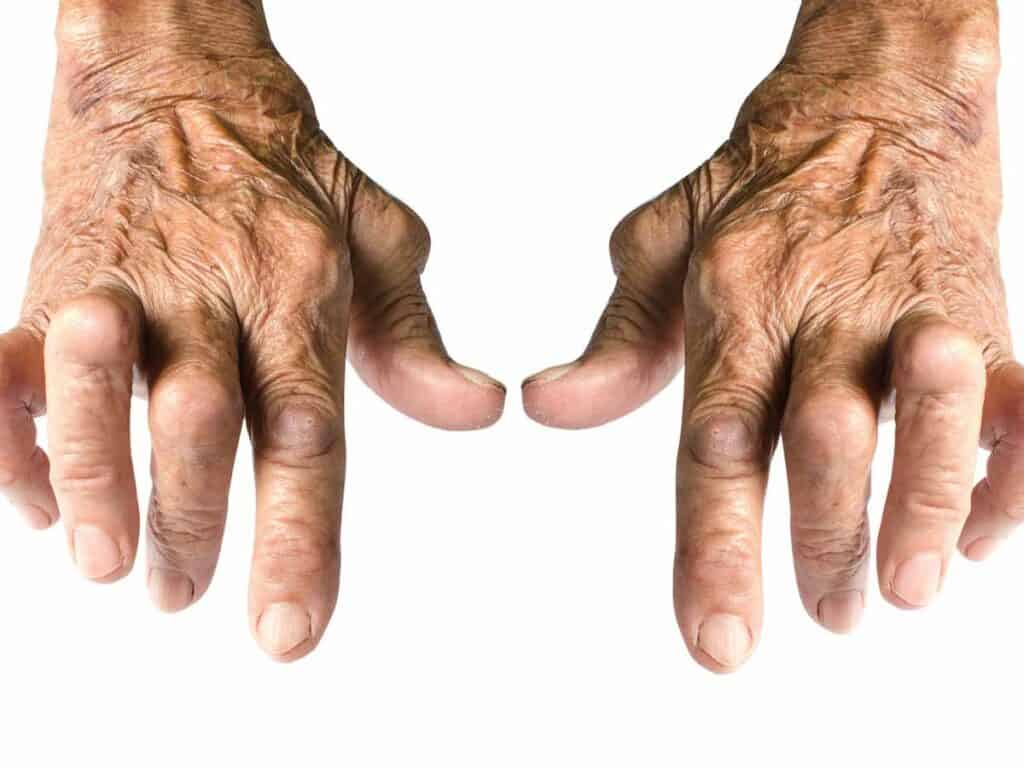
In a nutshell, rheumatoid arthritis is an autoimmune and inflammatory disease. So, in other words, the person’s very own immune system attacks healthy cells of the body, too, instead of just invading, disease-causing ones such as bacteria, viruses and parasites. This can cause inflammation of the various parts of the body.
The joints are what the immune cells attack primarily, usually many different joints at once.
Uncontrolled rheumatoid arthritis can cause problems such as chronic pain, unsteadiness and deformity in the long run. In some instances, the disease can also cause issues in various internal organs such as the heart and lungs.
According to neurologists, approximately 60% of individuals with rheumatoid arthritis have reduced cardiovagal baroreceptor responses and heart rate variability, too. This means that both their blood pressure and heart rate are unlikely to adjust accordingly to changes just like in healthy and normal people.
Due to this, there is a possibility for someone with rheumatoid arthritis who is undergoing a lie detector test to end up with either an inconclusive or a false positive result.
Rheumatoid arthritis can also leave you feeling fatigued and tired. It’s not recommendable for anyone to take a polygraph exam if they are exhausted as their vitals are commonly elevated. Especially if an inexperienced examiner is not aware of the presence of the condition, a truthful individual may be seen as being deceitful.
A rheumatoid arthritis flare-up can also leave you with a fever, which is also something that can affect a polygraph.
8. Respiratory Issues
It’s no secret that one of the things that a lie detector test machine observes is the breathing rate. Other than the number of times you breathe per minute, it also measures the intensity of your every inhalation and exhalation.
People who answer questions untruthfully tend to breathe faster and shallower, too.
And that is why someone who is suffering from asthma may end up with an inconclusive or even a false negative polygraph test result. This is especially true if the examiner is not aware or not made aware of the presence of the respiratory condition that can cause the airways to become narrow and swollen.
Besides asthma, emphysema and chronic bronchitis may also have an impact on the result of a polygraph examination. Both are considered under the chronic obstructive pulmonary disease (COPD) umbrella, which is a group of respiratory diseases that can cause airway blockage and breathing-related issues.
Besides, some drugs for asthma and COPD can affect some of a person’s physiologic responses.
A common drug prescribed to individuals with asthma called albuterol, for instance, can cause a rapid heart rate. In some cases, it may also cause heart palpitations. Some asthmatics who take the said drug also usually experience nervousness and shakiness, which can definitely affect a polygraph test result.
Even without taking any medication, it’s possible for the result of the lie detector test to be affected if the examinee is having a hard time breathing normally.
This is especially true since breathing can affect various physiologic processes measured in a polygraph test.
If you have a condition that affects your airways or lungs, it’s not unlikely for you to end up taking either very deep breaths or rapid, shallow breaths in an attempt to deal with shortness of breath, which the stress or anxiety that undergoing a lie detector exam causes can worsen.
Your heart rate will accelerate as a result of this in order to distribute all the oxygen you are flooding your body with. It will also speed up your metabolic rate, which can increase your core body temperature. And the hotter your body gets, the sweatier you become. As you can see, your lungs can affect various processes of the body.
And this is why polygraph examiners instruct examinees to avoid modifying or holding their breath.
Suffering from the common cold? Then it’s a good idea to take your lie detector test some other time. That’s because one of the symptoms of a cold is a fever — it can increase your temperature, blood pressure and heart rate, all of which some polygraph machines monitor and record at the same time.
You are likely to be sneezing and coughing, too, if you have a cold, which can keep you from staying still. When undergoing a lie detector test, keeping still from start to finish is a definite must.
9. Insomnia

When searching for tips before undergoing a polygraph examination, chances are that many sources will tell you to get a good night’s sleep prior to taking the test. This means that you should get 7 to 9 hours of sleep the night before if you want for the lie detector exam to go smoothly.
No matter if your lack of sleep is a one-time thing or an ongoing problem because of insomnia, it’s a good idea to schedule your polygraph exam wisely.
Unfortunately for those with the sleeping disorder, it can be hard to determine when the problem will subside.
The trouble with showing up to the lie detector testing center with very little to no shut-eye is that some of your physiologic processes can be all over the place. For instance, your blood pressure may be elevated and your heart may be beating rapidly or irregularly. As a result, the chart may suggest you are lying even when you’re not.
Failure to get enough Z’s can also diminish your cognitive functioning. When having a polygraph examination, it’s of utmost importance for you to focus and concentrate to be able to understand the questions.
Otherwise, you could end up blurting all the wrong answers, causing the innocent you to appear to be lying.
10. Alcoholism

Because it’s a central nervous system depressant, alcohol can affect problem solving, judgment and concentration. So, in other words, if you are intoxicated, your brain may have a hard time processing the questions thrown your way, causing either a false positive or false negative result to come into being.
The most severe form of alcohol abuse is referred to as alcoholism. Also sometimes called alcohol use disorder, it’s something that can cause long-term increases in your blood pressure and heart rate, too.
It can also cause arrhythmia or irregular heartbeat, which can confuse the lie detector instrument.
However, if it seems like the examinee is intoxicated, it’s very much likely for the examiner to refuse to administer the lie detector test. That’s because it will only contaminate and thus invalidate the result.
While we were discussing diabetes earlier, we mentioned peripheral nerve damage. Well, it can be brought about not only by a constant elevation of sugar in the bloodstream but also by chronic alcoholism. Also sometimes called alcoholic peripheral neuropathy by doctors, it’s something that can cause pain, numbness and/or pins and needles.
Damage to the peripheral nerves can reduce sweating, which can easily lead to a false positive or inconclusive result. This is especially true since the intake of alcohol can also cause the body to become dehydrated.
Conclusion
Got any of the above-mentioned medical conditions or something else that may affect the result of your lie detector test? Then make sure that you tell the polygraph examiner about it during the pre-test phase of the examination. It’s also a good idea to disclose any drugs or medications you are taking to put the health-related problem under control.
Read Next: Can Your Employer Force You To Take A Polygraph Test

